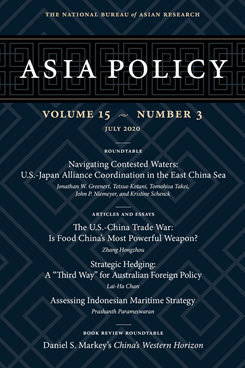The U.S.-China Trade War
Is Food China’s Most Powerful Weapon?
This article examines the concept of “food power,” analyzes China’s use of food as a foreign policy instrument against the U.S. in the context of their trade war, and considers the potential implications.
Executive Summary
MAIN ARGUMENT
The food power balance between the U.S. and China is affected by four key factors: scarcity, the concentration of supply, the degree of demand dispersion, and action independence. Since emerging as the leading food importer, China has successfully tipped the food power balance in its favor through overseas agricultural investment, import diversification, and cultivation of its own global agribusiness. In addition, the global food glut and the critical importance of rural support for Donald Trump’s re-election campaign further increase China’s leverage in bilateral food trade. With this newly gained food power, the Chinese government, which used to be a victim of U.S. food embargoes, has started using food as a foreign policy instrument to influence U.S. policy amid the ongoing trade war. While China appears to have achieved limited success against the Trump administration through food power, the potential costs to both China and the world of weaponizing food trade could be huge.
POLICY IMPLICATIONS
- While it is understandable that China seeks to leverage its newly gained food power against the U.S., serious caution must be exercised. There are severe liabilities for the global economy and adverse effects for both countries when food is weaponized.
- So long as the food relationship is relatively symmetrical, the political leverage that food provides China against the U.S. is ephemeral because the balance of food power could easily be tipped in either direction.
- Given China’s increasing dependence on the global market for its food supply, a stable and flourishing food trade system will be critical to the country’s overall food security. This means that attempts by China to use food as a foreign policy instrument are ultimately counterproductive.
Zhang Hongzhou is a Research Fellow with the China Programme in the S. Rajaratnam School of International Studies at Nanyang Technological University and a PhD candidate with the Lee Kuan Yew School of Public Policy at National University of Singapore (Singapore).
About Asia Policy
Asia Policy is a peer-reviewed scholarly journal presenting policy-relevant academic research on the Asia-Pacific that draws clear and concise conclusions useful to today’s policymakers. Asia Policy is published quarterly in January, April, July, and October and accepts submissions on a rolling basis. Learn more


